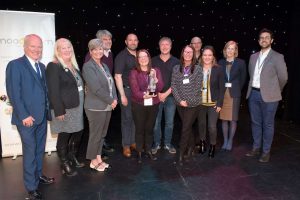 A Hull team has been crowned as the winner of the Humber Care Tech Challenge 2019 with their design on how to support people living with the dementia.
A Hull team has been crowned as the winner of the Humber Care Tech Challenge 2019 with their design on how to support people living with the dementia.
Team Ull-tra Fast designed a technological concept on how to ease the symptoms of dementia suffers who experience sundown syndrome. The term refers to an end-of-day confusion and restlessness that manifests at a certain time of day.
Research has shown that light enhances wellbeing and the dementia light-assist will improve the resident’s quality of life, whilst reducing calls to carers and emergency services during peak sundown periods.
The winning team involved staff from Hull City Council’s adult social care and IT departments.
Councillor Gwen Lunn, portfolio holder for adult services at Hull City Council, said: “This was a real team effort involving experts from across the social care, health and technological sector at the council.
“The dementia light-assist is an adaptable technology that can be programmed in with a resident’s current lifestyle and I look forward to seeing the final developed product that will seek to enhance dementia suffers quality of life.”
The product would work with easily accessible technology such as an Amazon Echo or Phillips Hue device and would use lights and acoustic stimulation to assist the user based on their daily living needs. It can also be integrated with existing technologies in the home.
The idea will now be developed into a product with support from Hull University, Amazon, C4DI, the region’s Clinical Commissioning Groups and East Riding of Yorkshire Council.
The Humber Care Tech Challenge took place at Bridlington Spa on 1-2 October and saw teams design and develop new and innovative technology-based solutions to help people and their carers live well with dementia.
This year’s event was led by the Hull Clinical Commissioning Group, East Riding of Yorkshire Council, three other NHS Clinical Commissioning Groups and the University of Hull, with expert support pledged by Amazon Web Services, KCOM, The One Point, C4DI, CDW, Moodbeam, Novartis Pharmaceuticals and Alzheimer’s Society.
Up to 15 teams took part in the two-day event. There were five finalists with ideas ranging from a shopping app, an app to keep all care plans in the same place and accessible to medical professionals/carers/family, the introduction of cameras into the home to monitor movement and detect deterioration in conditions and a digital memory/reminiscence box using Amazon Alexa technology.
John Skidmore, director of adults, health and customer services at East Riding of Yorkshire Council, and one of the judges, said: "It was so inspirational listening to the ideas as there was a lot of sweat and effort that went into coming up with these inspirational and beneficial concepts.
"Technology can help make the impossible possible and it can change lives and make a difference to people living with dementia as well as their families."

